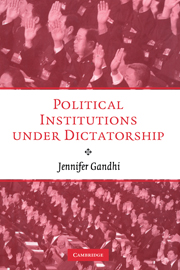Book contents
- Frontmatter
- Contents
- List of Tables and Figures
- Acknowledgments
- Introduction
- 1 The World of Dictatorial Institutions
- 2 Three Illustrative Cases
- 3 Use of Institutions to Co-opt
- 4 Institutions and Policies under Dictatorship
- 5 Institutions and Outcomes under Dictatorship
- 6 Institutions and the Survival of Dictators
- 7 Conclusion
- 8 Codebook of Variables
- Bibliography
- Author Index
- Subject Index
3 - Use of Institutions to Co-opt
Published online by Cambridge University Press: 25 July 2009
- Frontmatter
- Contents
- List of Tables and Figures
- Acknowledgments
- Introduction
- 1 The World of Dictatorial Institutions
- 2 Three Illustrative Cases
- 3 Use of Institutions to Co-opt
- 4 Institutions and Policies under Dictatorship
- 5 Institutions and Outcomes under Dictatorship
- 6 Institutions and the Survival of Dictators
- 7 Conclusion
- 8 Codebook of Variables
- Bibliography
- Author Index
- Subject Index
Summary
INTRODUCTION
As seen in the previous chapters, dictatorships vary in their institutional arrangements. In 12 percent of all dictatorial country-year observations, neither a legislature nor a political party existed. Monarchs are most likely to govern without institutions; one-third of them dispense with nominally democratic institutions. In contrast, civilian dictators rely heavily on them: there are almost two times as many civilian dictatorships with a single party rather than multiple parties, but almost all of them govern with legislatures. The organization of military regimes is much more varied.
The illustrative cases also display the variation in institutions under dictatorship. In Kuwait, the ruling family at first conceded institutions to the merchant opposition, only to rescind them after the discovery of oil. After independence, the kings of Morocco attempted to renege on institutional concessions as well, only to find that they could not engage in state-building and neutralize the opposition without the aid of nominally democratic legislatures and parties. Because they did not have the resources of the Kuwaiti emirs, Morocco's rulers wisely established these institutions to co-opt the opposition. In contrast, Rodriguez Lara failed to incorporate crucial elements of Ecuadorian society. By not providing a forum in which outside groups could issue demands, negotiate with the regime, and influence policy, the military government alienated even those segments of society that were designated beneficiaries of its programs.
- Type
- Chapter
- Information
- Political Institutions under Dictatorship , pp. 73 - 106Publisher: Cambridge University PressPrint publication year: 2008
- 1
- Cited by

